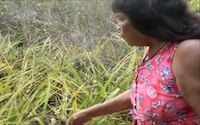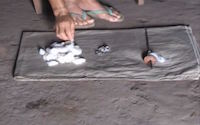The main goal of our research project is an extensive documentation of Trumai, with a multimedia representation of the corpus. For a good documentation, it is important to have a collection of linguistic and cultural materials, as well as a number of representative texts in the language, with audio or video recording, written transcription, interlinear glossing and comments. Such a collection will contribute to the preservation of Trumai, and will constitute a source of information for:
- the Trumai people themselves and their future generations;
- the general public, who could learn more about the tribes of South-America and their languages and cultures;
- researchers, such as linguists conducting typological studies or comparative work on Amerindian languages, anthropologists interested in Brazilian indigenous groups, historians trying to reconstruct the history of South-American tribes, and so on.
Several kinds of information and data types are being included in the archive of the language: texts with audio and video recordings; written texts from educational materials; drawings; series of photos; songs; annotations in different formats; lexicon; field notes; results from scientific studies of the language and people (e.g. sound system; sketch grammar; sociolinguistic characterization of the speech community; anthropological and historical studies, etc).
The project on Trumai participates in the DoBeS Program for the documentation of endangered languages, sponsored by the Volkswagen Foundation. In the DoBeS program there are two other projects also documenting Brazilian languages: Aweti and Kuikuro. The Trumai project is working in collaboration with them, given that the three languages under documentation belong to the same geographical area, the Upper Xingu. The Trumai, Kuikuro, and Aweti languages are genetically unrelated, but their speech communities belong to the cultural system found in that region. Comparative studies will be conducted, in order to obtain a better understanding of their societies.







